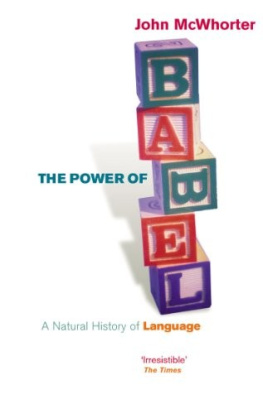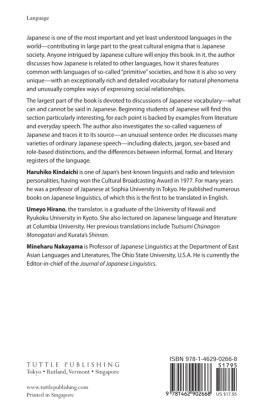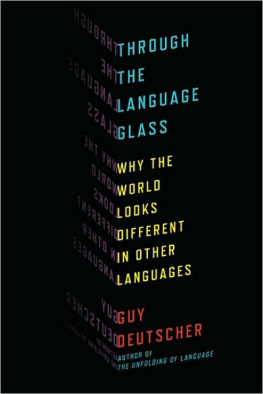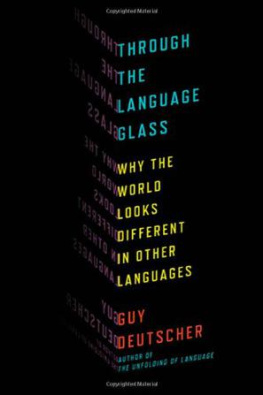The Language Hoax

The Language Hoax

Why the World Looks the Same in Any Language
John H. McWhorter


Oxford University Press is a department of the University of Oxford.
It furthers the Universitys objective of excellence in research, scholarship, and education by publishing worldwide.
Oxford New York
Auckland Cape Town Dar es Salaam Hong Kong Karachi
Kuala Lumpur Madrid Melbourne Mexico City Nairobi
New Delhi Shanghai Taipei Toronto
With offices in
Argentina Austria Brazil Chile Czech Republic France Greece
Guatemala Hungary Italy Japan Poland Portugal Singapore
South Korea Switzerland Thailand Turkey Ukraine Vietnam
Oxford is a registered trade mark of Oxford University Press in the UK and certain other countries.
Published in the United States of America by
Oxford University Press
198 Madison Avenue, New York, NY 10016
Oxford University Press 2014
All rights reserved. No part of this publication may be reproduced, stored in a retrieval system, or transmitted, in any form or by any means, without the prior permission in writing of Oxford University Press, or as expressly permitted by law, by license, or under terms agreed with the appropriate reproduction rights organization. Inquiries concerning reproduction outside the scope of the above should be sent to the Rights Department, Oxford University Press, at the address above.
You must not circulate this work in any other form and you must impose this same condition on any acquirer.
Library of Congress Cataloging-in-Publication Data
McWhorter, John H., author.
The language hoax: why the world looks the same in any language /
John H. McWhorter.
pages cm
ISBN 978-0-19-936158-8 (hardcover: alk. paper)
1. Language and culture. 2. Sapir-Whorf hypothesis. I. Title.
P35.M37 2014
306.44dc23 2013033221
1 3 5 7 9 8 6 4 2
Printed in the United States of America
on acid-free paper
For Dahlia
CONTENTS
CHAPTER 1
Studies Have Shown
CHAPTER 2
Having It Both Ways?
CHAPTER 3
An Interregnum: On Culture
CHAPTER 4
Dissing the Chinese
CHAPTER 5
Whats the Worldview from English?
CHAPTER 6
Respect for Humanity
THIS BOOK IS A manifesto. I will oppose an idea about language that took hold among certain academics starting in the 1930s, and of late has acquired an unseemly amount of influence over public discussion as well. This is the idea that peoples languages channel the way they think and perceive the world.
You may be familiar with it. Among memories of your readings over the past ten years, for example, may dwell Amazonian tribespeople described as unable to do math because their language doesnt have numbers. Or you may have read about people who have the same word for green and blue, who we are to imagine not perceiving the difference in color between a leaf and the sky as vividly as we do. The whole idea is a kind of ongoing promo from the worlds of linguistics, anthropology, and psychology, the ad jargon typified by the subtitle of Guy Deutschers Through the Language Glass, Why the world looks different in other languages.
The notion is, for better or for worse, mesmerizing. Just thinkwhat we speak is what we are. We are the language we speak.
This is true, of course, to an extent. A take-home insight from the idea that language channels thought is that a languages words and grammar are not just a random constellation, but are the software for a particular culture. No one could deny that there is some truth in that. In Thai, there are different words for you according to seven different grades of formality, and to not use them is not to be Thai, unless you are a child or new to the language. To pretend this has nothing to do with the highly stratified nature of Thai society in the past and present would be peculiar.
Vocabulary also reflects cultural concerns and not only in obvious areas such as technology and slang. Few people could be truly intrigued that we have names for computer components and salty terms relating to things like dating and social mores. However, quieter things say more than we always notice. Once, while staying at a hotel in the Bahamas I noticed a rather lovely cat gliding around outside. A Caribbean I was with said, Oh, that must be the hotel cat. That is, a cat who lives more or less around the place and serves as an unofficial mascot. I had never heard of a hotel cat. It would never occur to me to put hotel and cat together, and in fact, to me part of the essence of the hotel experience would seem to be an absence of cats.
However, that my friend would mention a hotel cat suggested that the relationship between felines and hotels was different depending on where I was. Even a detail in the way he said it gave away that he was referring to something culturally entrenched: he didnt accent it as hotel CAT, but as ho-TEL cat. If you think about it, the second way of saying it means hotel cats are, as one says these days, a thing. Think of how we say ICE cream rather than iced CREAMas one did when it was a novelty, or CELL phone rather than cell PHONEas I recall people saying in the early 1990s. In two-word expressions, the accent tends to shift backward when something becomes a thingthat is, culture! From the Caribbean mans one utteranceand not even a foreign oneI learned that mascot cats at hotels were a component of the local culture.
But the language as thought idea refers to much more than what qualifies it to its speakers as a thing. We are to suppose that the way a languages grammar works, and the way it applies words to even mundane objects and concepts, shapes how its speakers experience life in ways far beyond desserts and gadgets. Hotel catssure, but what about a language that gives you a whole different sense of time than anything we can spontaneously imagine, even if we are from the Bahamas?

This all became a going concern with Benjamin Lee Whorfs proposition in the 1930s that the Native American language Hopi has no way to mark timeno tense markers, no words like laterand that this corresponded with the Hopis sense of how time and the world work. English obsesses with placing events in the present, past, or future, Whorf argued, in contrast to a language like Hopi with no present, past, and future. In Whorfs sense of Hopi, present, past, and future are in essence the same, corresponding to the cyclical sense of time in Hopi cosmology. Thus its not by chance that Hopi has no equivalent to Englishs between walk, walked, and will walk: its about thought patterns. Culture. In Hopi, whether its about yesterday, tomorrow, or right now, you just walk.
Whorf was a fire inspector by day, and perhaps coming to linguistic study from the outside made him more likely to come up with out-of-the-box insights than would a card-carrying linguist. Because of Whorfs pioneering role in the field of linguistics, the whole idea has been coined Whorfianism, or the
Next page









